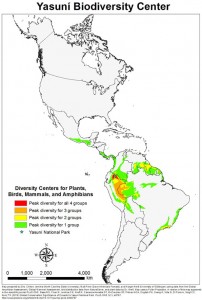Mapping Biodiversity
Ecuador sits on 800 million to 1 billion untapped barrels of oil. It’s a good problem for a nation to have, right?
Not necessarily, when the oil flows beneath parts of the Yasuní National Park – the home to a wide array of living things which is perhaps the most biodiverse area in the Western Hemisphere and arguably one of the most biodiverse areas on the planet.

So Ecuador is left with a Faustian bargain: drill for oil and sully these pristine areas? Or keep the land unblemished and leave an estimated $70 to 80 billion worth of oil underground?
Ecuador believed it had an answer. In 2007, it offered to the world its own bargain, the so-called Yasuní-ITT Initiative. It would leave the oil untapped in return for $3.5 billion from the international community, money that would then be used to green the Ecuadorian economy. That amount would replace half the revenue that the Ecuadorian government would stand to gain if it developed the oil in Yasuní.
Some call it “greenmail.” Others call it a small price to pay for biodiversity.
NC State biology researcher Clinton Jenkins joined colleagues to map out the striking South American biodiversity portfolio. Drawing on research published in PLoS One, Jenkins and colleagues show the Yasuní National Park area is a rarity indeed, with peak diversity for plants, birds, mammals and amphibians – a biodiversity grand slam.
Two weeks ago, as diplomats and heads of state came from nearly 200 nations to meet at the United Nations General Assembly, the map was part of the last-minute push to move the Yasuní-ITT Initiative forward. Ecuadorian president Rafael Correa has said that the initiative will be withdrawn if $100 million is not donated to the cause by the end of this year. So far, the Initiative is about halfway to the goal, with much of that as forgiveness of Ecuadorian debt.
Other issues – notably Palestinian statehood and global recession – stood out at the General Assembly. So it’s difficult to know if the Yasuní-ITT Initiative stands a chance.
But the clock is certainly ticking on the fate of Yasuní National Park and its diverse denizens.
- Categories:


